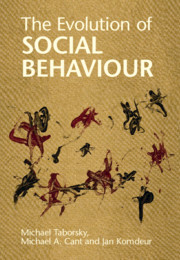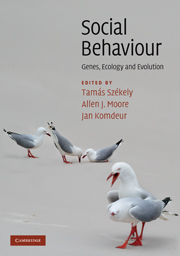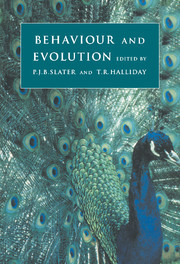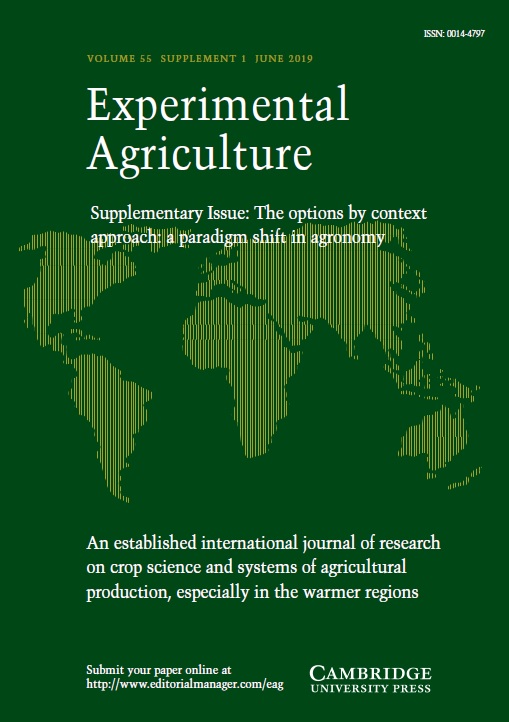The Evolution of Social Behaviour
- Authors:
- Michael Taborsky, University of Bern
- Michael A. Cant, University of Exeter
- Jan Komdeur, University of Groningen
- Date Published: August 2021
- availability: In stock
- format: Hardback
- isbn: 9781107011182
Hardback
Other available formats:
Paperback, eBook
Looking for an inspection copy?
This title is not currently available on inspection
-
How can the stunning diversity of social systems and behaviours seen in nature be explained? Drawing on social evolution theory, experimental evidence and studies conducted in the field, this book outlines the fundamental principles of social evolution underlying this phenomenal richness.To succeed in the competition for resources, organisms may either 'race' to be quicker than others, 'fight' for privileged access, or 'share' their efforts and gains. The authors show how the ecology and intrinsic attributes of organisms select for each of these strategies, and how a handful of straightforward concepts explain the evolution of successful decision rules in behavioural interactions, whether among members of the same or different species. With a broad focus ranging from microorganisms to humans, this is the first book to provide students and researchers with a comprehensive account of the evolution of sociality by natural selection.
Read more- Provides the first comprehensive overview of the evolution of social behaviour, showing how the intriguing diversity of social systems can be explained with only a few essentials
- Combines results from empirical and theoretical studies for an integrative insight into principles of social evolution
- Spans the whole range of organisms and evolutionary principles, thereby enabling a comparative evaluation of sociality and its underlying mechanisms across biology
Awards
- Finalist, 2022 PROSE Award for Biological Sciences
Reviews & endorsements
'Taborsky and his colleagues have worked hard to achieve an authoritative, theoretically sound and necessary updating of an important field of biology.' Richard Dawkins, University of Oxford, UK
See more reviews'The fruitful interplay between social theory and field studies, which forms the central theme of this wonderful book, will be inspirational to new students and experienced researchers alike.' Nick Davies, University of Cambridge, UK
'This is an exceptional book, well worth holding onto, if only for the synthesis of its chosen topic, the evolution of social behaviour in her many dimensions. Also captivating and compelling throughout.' Robert Trivers, Jamaica and USA
'Taborsky, Cant and Komdeur's assessment of progress in the theory, experiments and naturalistic observation of social behaviour is novel, authoritative, lively and provocative. This will be a go-to reference for years.' Richard Wrangham, Harvard University, USA
'How do we explain the amazing variation in social behaviours and association patterns of group-living species, including bacteria, insects and mammals? When does it pay off to cooperate, and when to escalate a fight? Three grandmasters in the field of social evolution have teamed up to provide us with a brilliant survey of the state of the art. Combining an introduction of key concepts with selected case studies, they show how the combination of theoretical modelling with empirical research fuels progress in the field of social evolution. They also make an excellent case for the importance of field studies. A must-read for all students and scholars interested in the riddles of social evolution.' Julia Fischer, German Primate Center and University of Göttingen, Germany
'A comprehensive and authoritative survey of the evolution of animal social behaviour that explains how conflict and cooperation interact to generate the astonishing diversity of animal societies.' Tim Clutton-Brock, University of Cambridge, UK
'Grounded in evolutionary theory and buttressed with empirical examples from the authors' own work in insects, fish, birds, and mammals, this book synthesizes decades of research on cooperation and conflict into a novel yet surprisingly simple framework for predicting how animals cope with competition. Arguing that individuals can succeed in resource competition by 'racing' others, 'fighting' for exclusive access, or 'sharing' both the trials and rewards, Michael Taborsky, Michael Cant and Jan Komdeur have successfully crossed taxonomic and disciplinary boundaries to outline the fundamental principles governing social evolution. This book is a must-read for anyone fascinated by the diversity of social life on earth, from microbes to humans and everything in between, and who wants to understand why social systems and behaviours have evolved.' Dustin R. Rubenstein, Columbia University, co-editor of Comparative Social Evolution (Cambridge, 2017)
'This masterful treatment of animal behaviour takes the perspective that interactions can be divided into racing for goods, fighting to monopolize them, or cooperatively sharing resources … With a focus on animals and easily observable behavioural decisions, Taborsky, Cant and Komdeur also show how conflicts can be resolved and when cooperation evolves, with or without high relatedness. The theory is firmly grounded in empirical observations. The book covers everything from competition for food, shelter or mates to the role of ecological clumping of resources, the importance of learning, sexual conflict, competition within cooperative groups, and between-species interactions. Each chapter ends with a case study applying the theory and concepts of the chapter to a specific organism. The book is a must-read for students of behaviour or evolution at all levels.' Joan E. Strassman, Washington University in St. Louis, USA
'Breaking taxonomic boundaries and providing a smooth passage between theory, experiment and observation, Taborsky, Cant, and Komdeur adroitly guide the reader through the fascinating world of social behaviour, to reveal the unifying logic of social evolution - natural selection's balancing act to harness the opposing forces of cooperation and conflict. This book is unique in that you can begin anywhere and read in any order; better still, do it differently each time and gain a new perspective.' Raghavendra Gadagkar, Indian Institute of Science, author of Experiments in Animal Behaviour: Cutting Edge Research at Trifling Cost (Indian Academy of Sciences, 2021)
'The Evolution of Social Behavior nicely captures the fascinating diversity of social behavior and some of the cool ideas used to explain it in a refreshing new way … the three authors are empirical leaders in the study of social behavior and their study subjects (insects, fish, mammals, birds) are diverse … This book is a necessary part of any behavioural ecologist's library. It contains a fresh approach to the topic with many thought-provoking ideas, some effective reviews of specific topics, and many excellent examples.' Dave Westneat, International Society for Behavioral Ecology Newsletter
Customer reviews
Not yet reviewed
Be the first to review
Review was not posted due to profanity
×Product details
- Date Published: August 2021
- format: Hardback
- isbn: 9781107011182
- length: 438 pages
- dimensions: 250 x 175 x 25 mm
- weight: 1.01kg
- availability: In stock
Table of Contents
Preface
1. Introduction
2. Non-interference rivalry
3. Conflict
4. Cooperation
5. Interspecific relations
6. Synopsis
References
Subject index
Taxonomic index.
Sorry, this resource is locked
Please register or sign in to request access. If you are having problems accessing these resources please email [email protected]
Register Sign in» Proceed
You are now leaving the Cambridge University Press website. Your eBook purchase and download will be completed by our partner www.ebooks.com. Please see the permission section of the www.ebooks.com catalogue page for details of the print & copy limits on our eBooks.
Continue ×Are you sure you want to delete your account?
This cannot be undone.
Thank you for your feedback which will help us improve our service.
If you requested a response, we will make sure to get back to you shortly.
×






